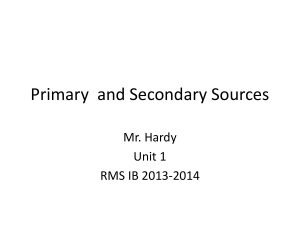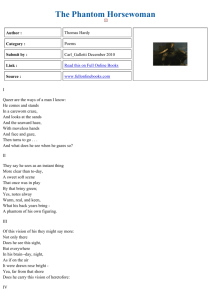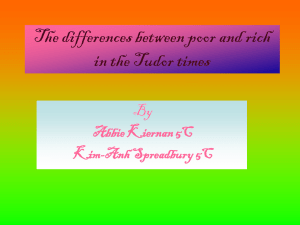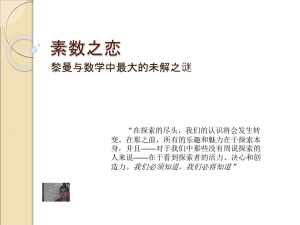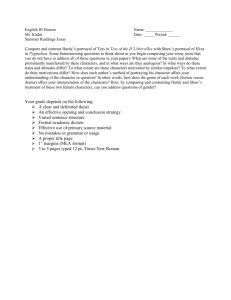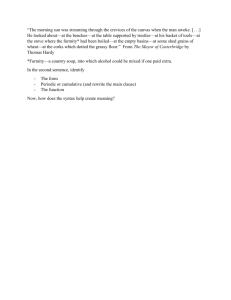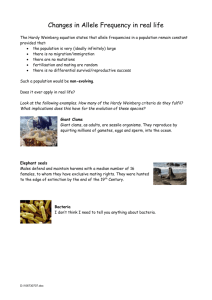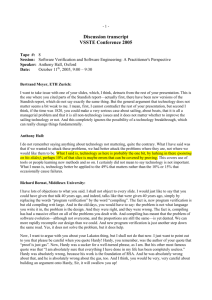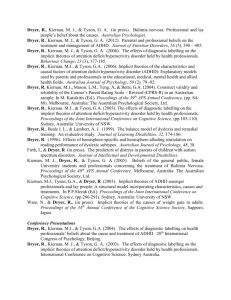Educational Autobiography: Tom Casey's Schooling Journey
advertisement
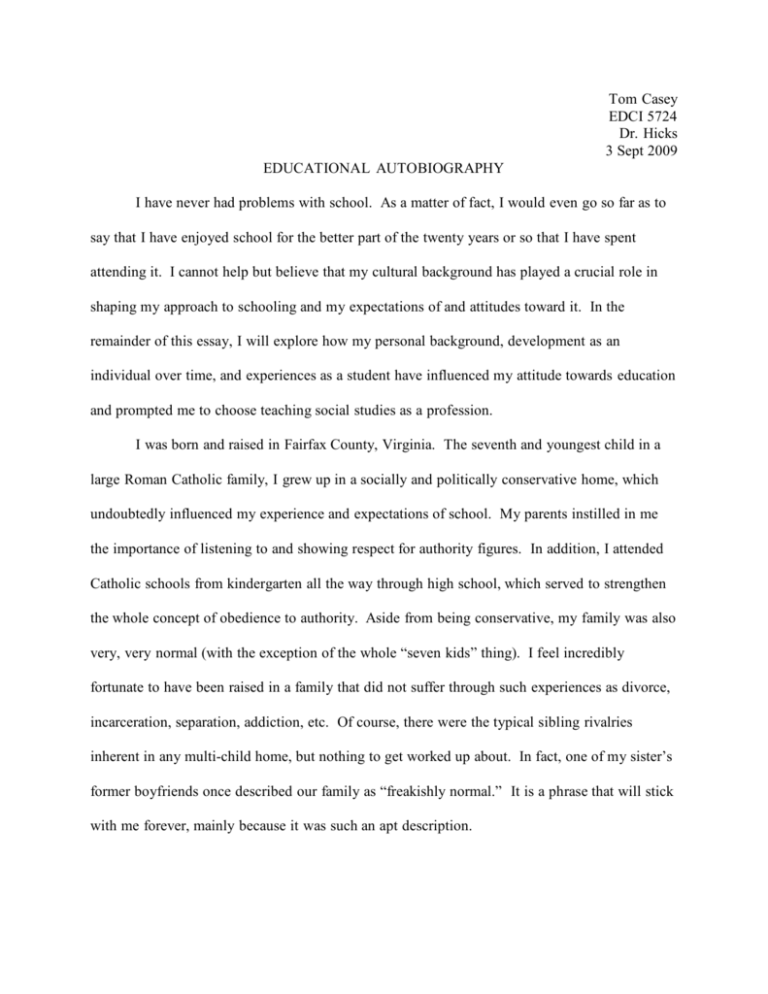
Tom Casey EDCI 5724 Dr. Hicks 3 Sept 2009 EDUCATIONAL AUTOBIOGRAPHY I have never had problems with school. As a matter of fact, I would even go so far as to say that I have enjoyed school for the better part of the twenty years or so that I have spent attending it. I cannot help but believe that my cultural background has played a crucial role in shaping my approach to schooling and my expectations of and attitudes toward it. In the remainder of this essay, I will explore how my personal background, development as an individual over time, and experiences as a student have influenced my attitude towards education and prompted me to choose teaching social studies as a profession. I was born and raised in Fairfax County, Virginia. The seventh and youngest child in a large Roman Catholic family, I grew up in a socially and politically conservative home, which undoubtedly influenced my experience and expectations of school. My parents instilled in me the importance of listening to and showing respect for authority figures. In addition, I attended Catholic schools from kindergarten all the way through high school, which served to strengthen the whole concept of obedience to authority. Aside from being conservative, my family was also very, very normal (with the exception of the whole “seven kids” thing). I feel incredibly fortunate to have been raised in a family that did not suffer through such experiences as divorce, incarceration, separation, addiction, etc. Of course, there were the typical sibling rivalries inherent in any multi-child home, but nothing to get worked up about. In fact, one of my sister’s former boyfriends once described our family as “freakishly normal.” It is a phrase that will stick with me forever, mainly because it was such an apt description. It was during this period of my life that I held the first of three distinct attitudes towards schooling that I can discern over the course of my educational history. From the beginning of my schooling as a kindergartner up until the early part of high school, I was the ultimate direction-follower. The teacher told the class what to do and I made sure I did it. As a child, I was quiet, introverted, and shy. I never got into trouble at school and always had my work done the way the teacher wanted it. Having the teacher (or my parents) become upset with me was terrifying. I sought approval from all of my teachers and felt that I had let them down if I failed to complete an assignment exactly according to the directions and expectations. Teachers at this point were the so-called “sages.” They asked the questions and I tried to find the answers that they already knew. In fact, I could not fathom at that point that teachers might have a purpose other than serving as the “knowledge-keepers.” I excelled in all of my classes, even through high school, but especially during elementary and middle school. I felt comfortable with what was expected of me, provided there were clear directions. I evinced fairly little creativity in the classroom and despised working in groups. Sharing the work would only slow me down and would lead to errors and inconsistencies that would be eliminated if I worked alone. On the whole, I felt most comfortable doing my assignments and being left alone. School during this period of my life was something that I did well, but it was something that I had to do. There was no choice to go or to not go to school. I could not even comprehend not going to school; kids that age go to school – it is their job for all intents and purposes – so why even put up a fight? As I moved from grade school into high school, I maintained a slightly altered version of this belief. School was something that I had to do, but I began to see somewhat of a purpose to the whole operation. I was raised in a white, upper middle-class family in one of the wealthier counties in the United States. Despite having seven children, my 2 parents were able to provide for us such that we could live comfortably. For most children/adolescents within this socio-economic category, you go to school so that you can get into a good college and then get a good job. Or so the argument has often been made. I began to glimpse this overarching purpose to education that seemed prevalent in the culture of my peer group. Many of my classmates began to get stressed out at about this point in our educational journey, but I remained even-keeled. In fact, my overall attitude toward school shifted dramatically into a second phase. In grade school and into the beginning of high school I felt obliged to follow directions and perform tasks to near-perfection out of a desire for approval from teachers. Somewhere around sophomore or junior year in high school, I came to the conclusion that getting approval from a teacher as an individual did not really matter; what was important was making it through the system and moving on to the next step: college. Going to school became as much about “playing the game” as it was about learning – and probably more so. If I could just keep my head down, so to speak, and do what my teachers wanted me to do, then I would get through high school and move on to college. My view of teachers changed, too. Whereas I had viewed my elementary and middle school teachers as the “knowledge keepers,” I saw most of my high school teachers as foremen on the production line, overseeing my progression from high school to college. There was a curriculum that I was expected to learn in order to get into a good college; the teachers were the ones who transferred the required data into my brain. A perfect example of this was my U.S. Government teacher, Mr. Toole. I took Mr. Toole’s regular-level class as a senior. Everyday in class, Mr. Toole handed out a worksheet that came from the textbook in which we either filled in blanks during his lectures or answered questions using the textbook. I was fairly content to just do my worksheets and get the class over with. I had 3 already been accepted into Virginia Tech in the fall of my senior year, so my primary objective was to avoid failing. Both he and other teachers asked why I did not take AP Government, or at least Honors-level Government. The reason was that I was already taking five AP courses and I did not think I could tackle another. The real reason, however, was that I disliked the AP Government teacher – a short-tempered nun with a lazy eye who always found something to criticize about everyone’s work. So even after having a change in attitude toward school, I still clung to somewhat of a need to gain approval from teachers and avoid criticisms and shortcomings. For the most part, my high school teachers presented a dearth of influential role models. Two, however, broke the trend and had significant impacts on my future decision to choose education as a career. Michael Kiernan was the head coach of the cross country and track teams, both of which I participated in for four years. Mr. Kiernan also taught me in AP Computer Science and Accounting. As a coach, Mr. Kiernan helped to strengthen in me the principles of hard work, perseverance, dedication, and selflessness – traits that certainly carry over into the classroom. In his classes, I appreciated the manner in which he structured our time together. The beginning of class was reserved for lecture, while the second half (sometimes more) was given to us as “free time,” in which we were to work on various assignments related to the course. The fact that both classes were advanced certainly played a role in the amount of leeway we were given, but ultimately we all appreciated the opportunity to explore the material in our own way. The second teacher who influenced my decision to enter the teaching profession was Michael Hardy. Mr. Hardy was a social studies teacher, who also coached me in distance running. I never had a class with Mr. Hardy, but I knew him very well and sat in on his class a few times. It seemed that there were always interesting discussions going on in his room, with 4 students actively engaged with the material and with each other. Though I would not realize it until years later, the learning environments created by these two teachers exemplifies the kind of social studies teacher I want to be. My get-to-college approach to school lasted well into college and only began to change during my junior year. I entered Virginia Tech as an engineering student and even made it to my second year, having been admitted into the Chemical Engineering Department. I recall sitting at my desk one night in September 2004 doing homework for a Chemical Engineering class and realizing that I could not do that kind of job, sitting in a cubicle all day crunching numbers. It was that night that I decided I wanted to become a teacher, though I foresaw myself teaching chemistry. I remember thinking back to Mr. Kiernan and Mr. Hardy and how I could see myself doing what they did as a career. I wanted to work with young people and be the kind of role model that Mr. Kiernan and Mr. Hardy were for me. I transferred into the Chemistry Department and spent about a semester there before transferring again, this time to the History Department. I had already been working on a minor in History, but the more courses I took in college, the more I realized I loved history. From the end of my sophomore year forward, I pursued my education with real purpose – not just to check something off a list and move on, but to increase my understanding of the world around me and how it came to be that way. Aside from personal awareness and intellectual stimulation, I wanted to learn as much as possible so that I could possess a degree of mastery over my content area in order to make my teaching more effective. Around this time, I started to become more comfortable working interactively, rather than doing everything solo. Where I used to thrive in courses that were purely lecture and notetaking, I started to become bored with that format and desired more dialog and opportunity for critical thinking and creativity. 5 As I begin my third (and hopefully final) year of graduate school, I can hardly believe that my time as a “student” is almost over. Of course, teachers never really cease being students. This is a concept I never grasped when I was in elementary, middle, and high school. Learning is a lifelong process, and perhaps more so for professional educators. I can always improve my knowledge, my teaching, my learning, and my thinking. Such is my outlook as I begin to make the transition to the other side of the desk. 6
